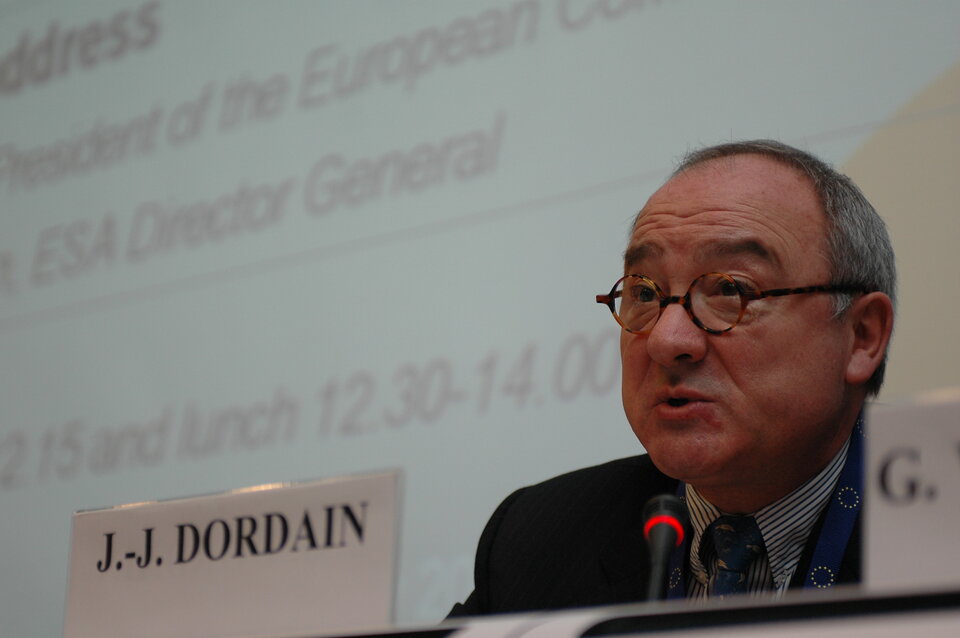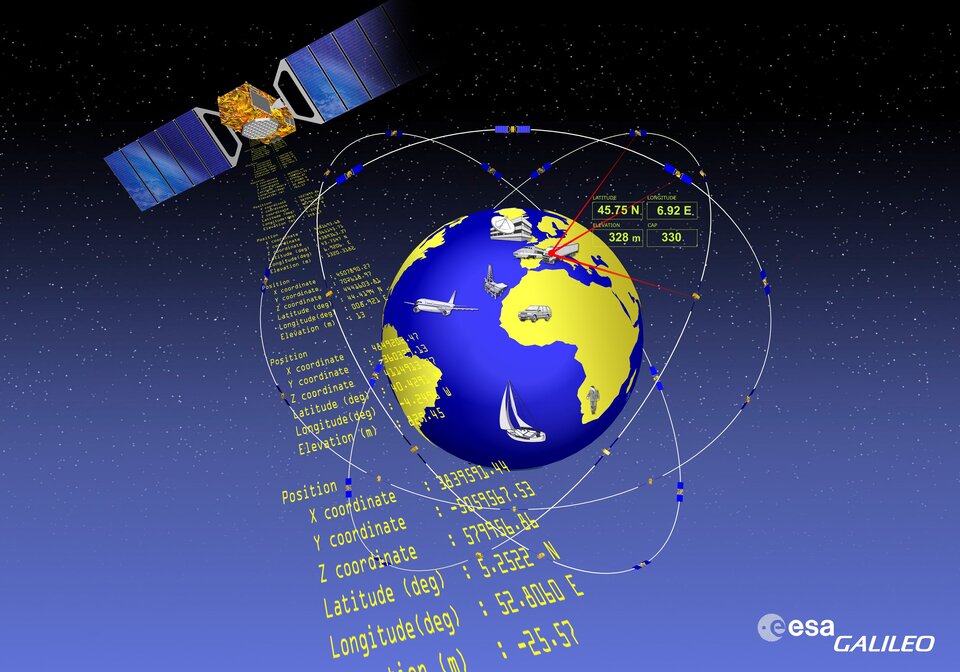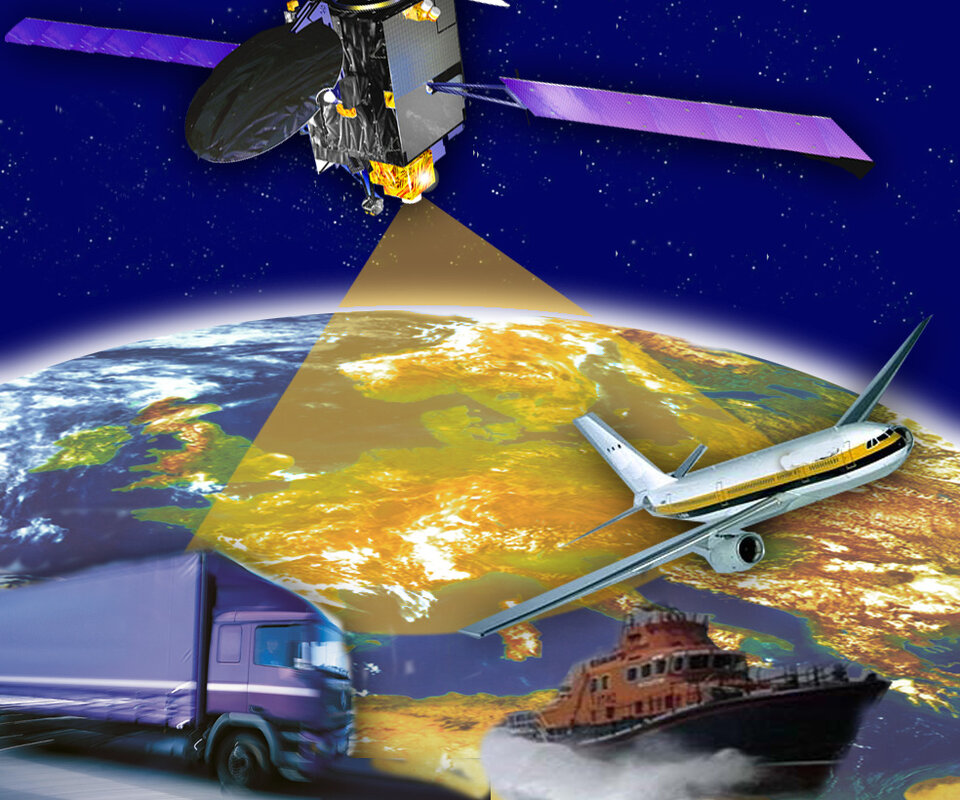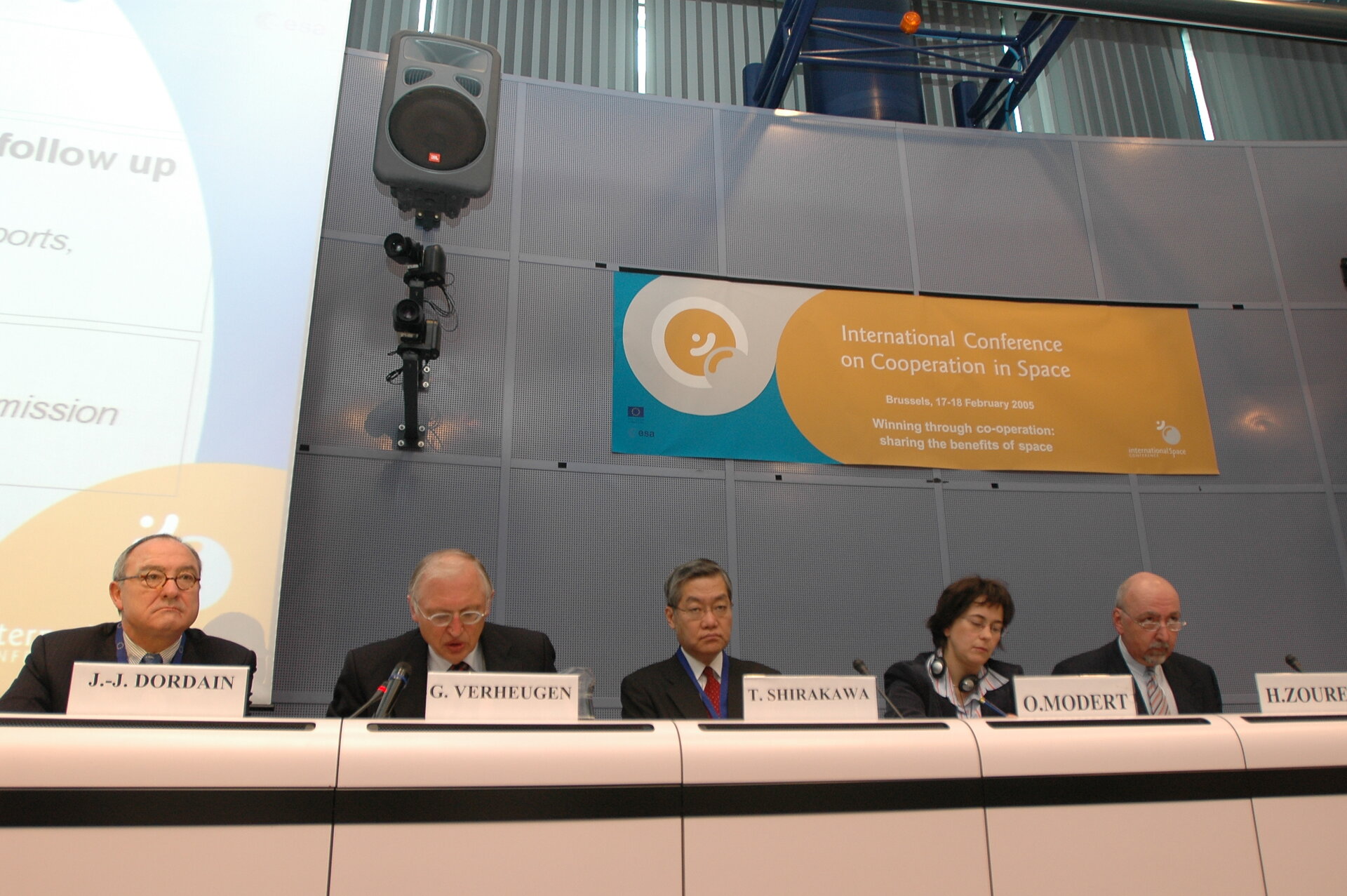Earth and Space Week cooperation conference hails GMES as example of benefits from space
Speaking from the European Commission Charlemagne Building on Thursday, ESA astronaut Andre Kuipers hailed the crew of the International Space Station: "Hello from Brussels, capital of Belgium and for one week the capital of space!"
Participants came from all over the world to attend the 'Winning through Co-operation: sharing the benefits of space' conference that topped off Earth and Space Week, with more than 40 nations and around 20 international organisations in attendance.
This two-day event was officially opened by a couple of speakers from off the planet entirely, International Space Station (ISS) crewmembers Leroy Chiao and Salizhan Sharipov speaking via audio link from 358 kilometres above the surface of the Earth.
Chaio called ISS a symbol of global cooperation and said they were keeping busy maintaining the station and preparing for the Space Shuttle return to flight so that station construction could be completed by the international partners: "We know how important international cooperation is in this day and age, both in space and other areas."
Addressing the conference by video, ESA President and German Education and Research Minister Edelgard Bulmahn said that space was becoming indispensable in more and more areas of life, including the fields of environmental policy, transport, agriculture and security. "There is a saying in Germany: 'All good things come from above'," she said.
She said that improving coordination of environmental observation efforts was crucial for the future, and that in this context ESA and the European Union were well on their way to establishing the Global Monitoring for Environment and Security (GMES) initiative as a means of responding to real problems of our environment and humankind.

Pascale Sourisse, Chief Executive Officer of Alcatel Space and Chair of the EUROSPACE space industry group summarised the conclusions of the Earth Observation Business Summit that had taken place the previous day, stating that GMES was a "grand, coherent well-supported European plan" to help with disaster response and environmental deterioration, and that industry stood ready to be an active partner of the European Commission (EC), ESA and member states.
Tetuhisa Shirakawa, Japanese Deputy Minister of Education, Culture, Sports, Science and Technology, stated he was also co-chair of the Group on Earth Observation (GEO) that had prepared the ten-year implementation plan for a Global Earth Observation System of Systems (GEOSS) agreed by the Third Earth Observation Summit on Wednesday.
He said that agreement of the plan represented an excellent opportunity, and that Earth Observation systems had made technical progress in just a few years, and singled out the environment and security-focused services being provided under GMES as one of Europe's 'excellent results' from space.
He spoke about the international participation in Japan's World Conference on Disaster Reduction that took place in Kobe the previous month, adding that as a survivor of the 1995 Kobe earthquake he was well aware of the importance for disaster mitigation. Japan's Advanced Land Observing Satellite (ALOS) would launch this year, adding to the space resources available for disaster reduction and environmental monitoring.
European Commission vice-president Günter Verheugen stated that Earth Observation and GMES was a means of delivering maximum value from Europe's investment in space, giving the continent the ability "to manage and mitigate risk for citizens and act in solidarity with victims of disaster."

ESA Director General Jean-Jacques Dordain began by saying that the EC and ESA can expect together "have a brilliant future in space." He added that as an Agency of 15 member states "International cooperation is our daily life at ESA".
And as well as cooperation within ESA, there was international cooperation beyond it, with many of the Agency's achievements – from the Huygens landing on Titan in cooperation with NASA to the setting up of the Charter on Space and Major Disasters with the French space agency CNES – had taken place thanks to international partners.
"We know international cooperation is important, though it can be difficult," Dordain said. "The differences appear on the first day and every day after but the achievement comes only on the last day – but the sweetness of the achievement lasts longer than the bitterness of differences!"
He hailed the growing relationship between the EU and ESA, giving the examples of Galileo and now the GMES joint initiatives as solid models of international achievement.
"Earth Observation is increasingly used to monitor the environment across the world," said Dordain. "Our Envisat satellite especially has scientific users in more than 50 countries and is being used not only for science but to demonstrate the first operational services with GMES."
Dordain finished by saying that GMES was open to international partners and would be the European contribution to GEOSS.
The Cooperation Conference topped a week of events that also included conferences on the future of human space exploration and space travel and education, as well as the highly popular nine-day public Earth and Space Week Expo taking place in Autoworld, due to finish on Sunday.
Galileo rising

The Earth Observation-based GMES is actually the second major space initiative embarked upon by the EC and ESA. The first was the Galileo satellite navigation system, a planned 30-spacecraft constellation to supply civilian-run navigational information and related services. The current status of Galileo was the topic of a press briefing at the Expo on Tuesday.
"The first of two test satellites is set to launch before the end of 2005 and the other will follow it into orbit by the middle of next year," said Heinz Hilbrecht, Director for Trans-European Networks and Energy at the European Commission Directorate-General Energy and Transport. "We plan for the service to begin operations in 2008."
Agreement has been made that Galileo and the existing US Pentagon-operated GPS service will work together seamlessly, with their combined total of more than 50 satellites providing greater accuracy and robustness of service. Even if one system goes completely out of action then the other has full redundancy.

Within European boundaries, a signal accuracy-enhancement service called EGNOS (European Geostationary Navigation for the Safety of Air Navigation) means that sub-metre accuracy could be attainable once Galileo becomes fully operational. Designed to make satellite navigation usable for safety critical applications such as aviation and ship navigation, EGNOS is due to go live in the middle of this year.
Galileo is being run as a Joint Undertaking between the EC, ESA and participating third countries – the US, China and Israel so far, with other nations in negotiations to join. A private sector concessionaire will manage and operate the Galileo system, with the preferred bidder set to be announced at the beginning of March.
Projected applications for the service include road and rail transport, agriculture, fisheries, recreation – "and some we don’t know about yet," Hilbrecht added. Obvious possible synergies exist between Galileo and other areas, such as telecommunications and GMES services.
One prediction is that by 2020 there will be three billion satellite navigation receivers in existence; representing a €275 to 300 billion market. With such figures in mind, and set against other transport projects, Galileo looks like a bargain – its €3.4 billion price-tag would only buy a comparatively misery 150 kilometres of semi-urban motorway.
"Galileo is the initiator of European space policy, and has become a powerful vector of international cooperation," Hilbrecht concluded. "When Europe comes together it can do great things."










